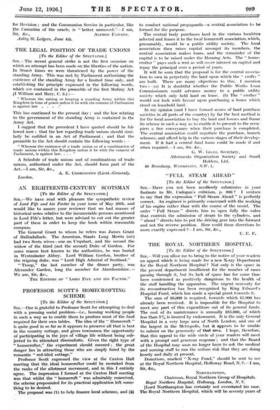. THE LEGAL POSITION OF TRADE UNIONS • [To the
Editor of the SPECTATOR.] SIR,—The recent general strike is not the first occasion on which an attempt has been made on the liberties of the nation. In Stuart times we were threatened by the power of the standing Army. This was met by Parliament authorizing the existence of the standing Army for a limited time only, and establishing the principle expressed in the following words, which are contained in the preamble of the first Mutiny Act (I William and Mary, C. 5.) :— " Whereas the raising or keeping a standing Army within this Kingdom in time of peace unless it be with the consent of Parliament is against law , . . ."
This has continued to the present day ; and the law relating to the government of the standing Army is contained in the Army Act.
I suggest that the precedent I have quoted should be fol- lowed now : that the law regarding -trade unions should simi- larly be codified in an Act of Parliament; and that the preamble to the Act should contain the following words :--
"Whereas the existence of a trade union or of a combination of trade unions within this Kingdom unless it be with the consent of Parliament, is against law. .
A Schedule of trade unions and of combinations of trade unions, authorized under the Act, should form part of the London.
A. E. CODRINOTON (Lieut.-General).






















































 Previous page
Previous page